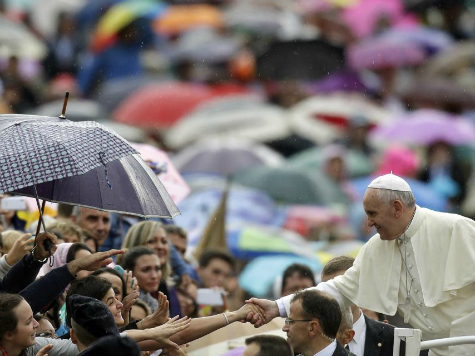In his address Tuesday morning to the European Parliament, Pope Francis issued a powerful plea to Europe to rediscover its religious roots and to place the human person at the center of society.
“A Europe which is capable of appreciating its religious roots and of grasping their fruitfulness and potential,” Francis said, “will be all the more immune to the many forms of extremism spreading in the world today.” It is not religion that causes fanaticism, the Pope said, but “man’s forgetfulness of God, and his failure to give him glory, which gives rise to violence.”
The Pope challenged members of the European Parliament to keep “democracy alive for the peoples of Europe.”
Democracy has its enemies and “keeping democracy alive in Europe” requires avoiding the temptations that can undermine it, including “angelic purism, dictatorships of relativism, ahistorical fundamentalisms, ethical systems without goodness, and intellectualism bereft of wisdom,” the Pope said.
The Pope said that keeping democracies alive “is a challenge in the present historic moment.” The true strength of our democracies, he continued, “understood as expressions of the political will of the people – must not be allowed to collapse under the pressure of multinational interests which are not universal, which weaken them and turn them into uniform systems of economic power at the service of unseen empires.”
Europe, the Pope said, is often perceived as “elderly and haggard,” like a “grandmother, no longer fertile and vibrant.” As a result, the rest of the world looks upon it “with aloofness, mistrust and even, at times, suspicion,” he said. The “great ideas which once inspired Europe,” he said, seem to have been replaced “by the bureaucratic technicalities of its institutions.”
The results of this ageing are tragic. “Men and women risk being reduced to mere cogs in a machine that treats them as items of consumption to be exploited,” Francis said. Because of this, “whenever a human life no longer proves useful for that machine, it is discarded with few qualms, as in the case of the terminally ill, the elderly who are abandoned and uncared for, and children who are killed in the womb.”
The Pope decried situations in which “human beings are treated as objects whose conception, configuration and utility can be programmed, and who can then be discarded when no longer useful, due to weakness, illness or old age.”
“What kind of dignity is there,” the Pope asked, “without the possibility of freely expressing one’s thought or professing one’s religious faith? What dignity can there be without a clear juridical framework which limits the rule of force and enables the rule of law to prevail over the power of tyranny?”
What can be done about this? “The future of Europe,” the Pope said, depends on the recovery of the “vital connection” between heaven and earth. The peoples of Europe, he added, have always been distinguished by “openness to the transcendent – to God.” Therefore, a “Europe which is no longer open to the transcendent dimension of life is a Europe which risks slowly losing its own soul,” he said.
Christianity’s contribution to Europe, the Pope continued, “does not represent a threat to the secularity of states or to the independence of the institutions of the European Union, but rather an enrichment.”
Citing an ancient text, the Pope said that “Christians are to the world what the soul is to the body.” The role of Christians in society “is to support the body, to be its conscience and its historical memory,” the Pope said. “A two-thousand-year-old history links Europe and Christianity… This history, in large part, must still be written. It is our present and our future. It is our identity,” he said.
“The time has come,” the Pope concluded, “to work together in building a Europe which revolves not around the economy, but around the sacredness of the human person, around inalienable values.” Our task, he said, is to build “a Europe which courageously embraces its past and confidently looks to its future in order fully to experience the hope of its present.”
“The time has come for us to abandon the idea of a Europe which is fearful and self-absorbed, in order to revive and encourage a Europe of leadership, a repository of science, art, music, human values and faith as well,” he said.
Thomas D. Williams can be followed on Twitter @tdwilliamsrome

COMMENTS
Please let us know if you're having issues with commenting.